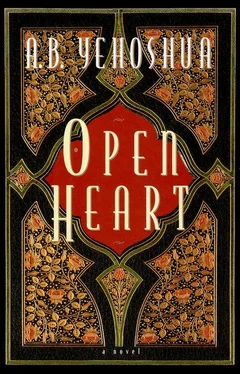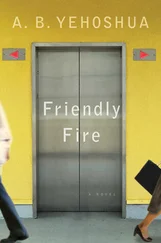A. Yehoshua - Open Heart
Здесь есть возможность читать онлайн «A. Yehoshua - Open Heart» весь текст электронной книги совершенно бесплатно (целиком полную версию без сокращений). В некоторых случаях можно слушать аудио, скачать через торрент в формате fb2 и присутствует краткое содержание. Год выпуска: 2014, Издательство: Peter Halban, Жанр: Современная проза, на английском языке. Описание произведения, (предисловие) а так же отзывы посетителей доступны на портале библиотеки ЛибКат.
- Название:Open Heart
- Автор:
- Издательство:Peter Halban
- Жанр:
- Год:2014
- ISBN:нет данных
- Рейтинг книги:3 / 5. Голосов: 1
-
Избранное:Добавить в избранное
- Отзывы:
-
Ваша оценка:
- 60
- 1
- 2
- 3
- 4
- 5
Open Heart: краткое содержание, описание и аннотация
Предлагаем к чтению аннотацию, описание, краткое содержание или предисловие (зависит от того, что написал сам автор книги «Open Heart»). Если вы не нашли необходимую информацию о книге — напишите в комментариях, мы постараемся отыскать её.
Open Heart — читать онлайн бесплатно полную книгу (весь текст) целиком
Ниже представлен текст книги, разбитый по страницам. Система сохранения места последней прочитанной страницы, позволяет с удобством читать онлайн бесплатно книгу «Open Heart», без необходимости каждый раз заново искать на чём Вы остановились. Поставьте закладку, и сможете в любой момент перейти на страницу, на которой закончили чтение.
Интервал:
Закладка:
The dream I had had on the plane disturbed me but also served me a warning: I must not get lost here. My purpose was to ascertain the liver functions, the two transaminases, the clotting factors, and the glucose levels. I had full confidence in the Indian doctor and his brother. They were connected with the University of Calcutta. But when the cabdriver dropped me outside a regular apartment building in a little alley, without any sign of a medical laboratory, my spirits fell, and I would not release the cabbie until he led me to the doctor’s door. To my surprise, the shabby apartment building, which was only a few stories high, possessed a little elevator, but it was impossible to tell if it was working, for there were a number of people sleeping in it, huddled together like a tangle of black snakes. At this early hour the stairwell too was full of sleeping people. The cabbie immediately removed his sandals and stepped over them barefoot, and I too took off my shoes and tried to glide over them in my socks. In that way we reached my doctor’s flat, where we found a card like the one in my pocket pinned to the door. The cabbie was not content with leading me to the door but went inside to drag the doctor out of bed. The doctor, with only a narrow loincloth on his smooth, slender body, which looked like that of a boy, was not at all surprised to see me standing before him. He cried joyfully, “All the time I’ve been saying to my brother, Dr. Benjamin will have to come to us in the end if he wants to know the truth. But who would have believed that he would come so early?” He laughed and ushered me into a big, dim room full of carpets and ornaments, where two little girls were sleeping on the couch. He removed them quickly to the next room and returned after a few minutes in a pale European suit. He immediately took the samples from me, listened attentively to what I had to say about my patient’s condition and my suspicions, and in a clear firm hand wrote down the particulars of the tests I wanted performed, with which he appeared to be thoroughly familiar. Nothing seemed to him either impossible or superfluous. Finally he stood up and said, “Give me half a day and my brother and I will have all the results ready for you. If you don’t make the afternoon flight, you can always take the five o’clock train, which reaches Gaya at dawn.” He then spread a thin, colorful rug on the couch where the little girls had been sleeping, beat the cushions lightly, and turned them around. He scattered a few joss sticks in an ashy incense bowl, lit them to banish the smells of the night, and said, “You can rest here and even sleep, and return tonight refreshed to the patient for whose sake you came all the way to Calcutta.”
I found myself in a rather pleasant room, with chains of flowers and little statues of gods with elephant and monkey faces. The subtle scent of incense pervaded my senses. There was no sign of hell here. I immediately sat down on the couch in my socks and thought how strange my journey to this place had been, and wondered whether it had really been purely out of concern for my patient or whether I wanted to prove to Hishin what a devoted and determined doctor I was and how far I was prepared to go to obtain all the relevant data about my patient’s condition. I took the second postcard out of my pocket and wrote in a rather lighthearted vein: “Dear Professor Hishin, Regards from Calcutta, which is the lowest of the low as far as human suffering and poverty are concerned. I arrived here alone to obtain a reliable and detailed diagnosis for our patient, whose condition is more worrying than you thought. The Lazars are nice and India is interesting. Yours, the ‘ideal’ man.” I wanted to add, “whom you seduced,” but I stopped myself. What would he understand by it? Even the word “ideal,” which I had put in quotation marks, seemed superfluous. What if he didn’t remember? I put the card in my pocket. It would reach him after I arrived home, so what was the point? I took off my sweater and heard light footsteps behind the door. Did the doctor’s wife know who I was and what I was doing here? But the couch was soft, and I stretched out on it in profound weariness, thinking to myself, This is a little paradise in the midst of the hell which I haven’t yet really felt, and maybe I won’t feel it at all, and in any case I have no intention of boasting about having been in it.
But in spite of my tiredness I couldn’t really fall asleep, but only dozed, because the sleepers on the stairs began to wake up, and the residents tried to chase them away, and the elevator, which had apparently been relieved of its nocturnal refugees, began creaking up and down on its cables, and the doctor’s two little girls opened and shut the door to peek at me, trying to wake me up, until I finally had to invite them in. They hesitated, but in the end came shyly into the room, dressed in their school uniforms, which consisted of flimsy pink saris, with blue ribbons in their hair and satchels on their backs. I tried to get them to talk to me and to amuse them by making funny faces, but they didn’t laugh; maybe they thought my grimaces were natural to a Western face. In the end their mother came to take them to school, but she was hesitant about leaving me alone in the apartment. “In that case, perhaps I should go out and walk around the town a little. Is there a river here?” I asked. And of course there was a river, which was called the Hooghly River, with ghats of its own, and there was a fort here too, called Fort William, which was situated in the beautiful Maidan of Calcutta. It would be a pity not to see the sights, I thought, and said good-bye to my hostess. When I went downstairs I counted the stairs and made a note of their number, so I wouldn’t have any problems finding the right apartment. I went outside and noted landmarks to help me identify the alley too, and walked up and down to practice remembering the location of the building, but when I left it and turned into the main street, I was immediately surrounded by the milling crowds and realized that I was the only foreigner there. I felt suddenly weak, and I remembered my dream. I had to be careful not to go too far, to watch myself, because I had to get back; Lazar’s wife had placed her trust in me. I wasn’t a tourist, I was a doctor on duty, and I had to get back tonight to my patient, whose delicate jaundiced face came into my mind from time to time, accompanied by the meaningless smile flashing in her mother’s eyes. I decided to forgo the river and its ghats, as well as the important fort and the beautiful Maidan, and to confine my movements to a safe, narrow circle, without losing touch with the street. Every half-hour or so I would return and stand in front of the building, and sometimes I would go upstairs and knock on the door to see if the results had already arrived. In one of the nearby streets a building with a big crowd jostling in front of it attracted my attention. At first I thought it was another temple, but when I went closer I saw that it was a big old cinema, covered with colorful posters. On the sidewalk lay an old woman who appeared to be dying, with some lepers sitting next to her looking with burning eyes at the people going into the cinema. Perhaps I had better see India in a movie, I thought. I bought a ticket and entered a big, dark hall with crumbling carvings on its many pillars. Rows of heads greeted my eyes, some of them turbaned and others bare — smooth-shaven, wild, or curly. As I walked in they almost all turned, as if there were something unique and strange about my smell or footsteps. I selected a seat in one of the middle rows, and they all stood up eagerly to let me pass and smiled at me encouragingly. But before long an usher with a badge pinned to his chest arrived and started persuading me to move to another seat, apparently a seat of honor. At first I tried to refuse, but he pointed to the people around me and said, “Bad people, bad people,” and they all smiled at us. Again I tried to refuse, but he insisted, coming all the way down the row and gripping my arm forcibly, pointing once more to the people around me, who never stopped smiling. In the end he led me to an armchair upholstered in red velvet, which had grown pink and stubbly over the years, like the pelt of a mangy old animal. And on the seat which had perhaps known guests more notable than myself, I sat and watched a movie without subtitles, in which a lean young Indian movie star suffered the pangs not of hunger but of love.
Читать дальшеИнтервал:
Закладка:
Похожие книги на «Open Heart»
Представляем Вашему вниманию похожие книги на «Open Heart» списком для выбора. Мы отобрали схожую по названию и смыслу литературу в надежде предоставить читателям больше вариантов отыскать новые, интересные, ещё непрочитанные произведения.
Обсуждение, отзывы о книге «Open Heart» и просто собственные мнения читателей. Оставьте ваши комментарии, напишите, что Вы думаете о произведении, его смысле или главных героях. Укажите что конкретно понравилось, а что нет, и почему Вы так считаете.












